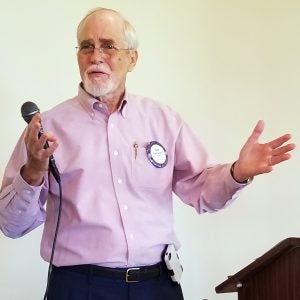Messer shares his story of growing up, working to address poverty
Published 6:25 am Wednesday, June 20, 2018
By DAVE FAIRCHILD
Danville Rotary
On June 15th, Danville Rotary members heard about a young man’s experiences growing up in Appalachia from a first-person account. The speaker was a member of Rotary, as was his daughter, who introduced him two days before Father’s Day. The daughter was Valery Messer-McMann, a financial advisor at Farmer’s National Bank. Her job’s significance will be better understood later.
Flem Messer was born in Mills Creek, Kentucky in 1935, the oldest of eight children. He grew up in small log cabin with no running water a very remote area of the Appalachian Mountains in Southeastern Kentucky. The family was totally dependent on the land to grow and harvest almost all of their food using mule-drawn plows. Food was prepared on a wood burning stove.
Later, Messer wrote a book titled, “An Appalachian Boy’s Life,” in which he says the experiences of his life have spanned three centuries. His reasoning was that during his early years the family lived in the same way that his great grandparents did in the 1860s.

Photo by Dave Fairchild
Flem Messer speaks to members of Danville Rotary on June 15.
Messer spoke of his deep feelings about the devotion to family and community that existed in his childhood years in Appalachia. He credits it with creating a sustaining sense of independence together with a sense of gratitude for the generosities of others. “Ours was a cooperative barter society where people worked together and always helped each other when there was a need.”
By the time he was 15, Messer had become dissatisfied with the lack of progress in his education and dropped out of school.
Messer had just turned 17 when his Uncle, who was 22, asked him to go to Indianapolis with him to get a job. It was the first time Messer had traveled out of Kentucky. After lying about his age — a minimum age of 18 was required — he got a job. Four months later, he was called into the manager’s office where the supervisor informed him he might be offered the job of supervisor. Next, he was asked how much education he had. Messer did not lie this time, which resulted in him being told that his education was not enough to get the position. Several weeks later, he was laid off.
He resolved to never be told he did not have enough education again. A few months after returning home to Manchester, Messer learned about the Berea Foundation School that accepted anyone 15 years of age and allowed people to advance as fast as they were able to absorb the material. He arranged to have someone to drive him to Berea, where he was told that classes started the next morning.
He hadn’t brought any clothes, but that did not keep him from grabbing the opportunity to get a high school diploma. Three weeks later, he finally received clothes his mom sent and could wear some fresh outfits. At the end of his first semester he was promoted to high school.
Three and a half years later he attended a conference paid for by a professor that had befriended him. His good fortune continued, with an offer to pay his board and room during a visit to Gatlinburg, Tennessee, where he met the Director of a junior college called the Southern Indian College located in Alabama. He was accepted at the junior college without completing his high school curriculum in Berea.
Eight and a half years after enrolling in the Berea Foundation School he graduated from Union College in Barbourville with bachelor’s in history and political science and a minor in English.
His first job involved using his teaching certificate to help homebound children keep up by tutoring them in their home. He was supposed to get a teaching position in the high school the following year, but political fallout resulting from a poll-watching assignment forced him to resign.
After a few filler jobs, Messer was called back to Berea for a job interview. An organization called “Appalachia Volunteers” that was part of the newly established program called “The War On Poverty” had recently received a grant. He was immediately offered a job that paid quite a bit more than the position he lost over the adverse political fallout.
The Appalachia Volunteers staffing was largely drawn from people with no knowledge about the Appalachia region and did not prove to be effective in helping people in the region. The program’s agenda seemed to focus on protests against the Washington politicians, rather than in organizing people to help themselves. Messer became disenchanted and quit after three and a half years. Shortly thereafter, the program lost its funding.
Messer’s next job was as the director of another poverty project located in Paducah, which focused on low-income blacks. His leadership was not well received by the local political establishment, which favored segregating rather than integrating with the people Messer was trying to help. He again left after about 18 months.
For a while, he traveled around eastern Kentucky training people in poverty-related organizations. That led him to becoming a consultant to community action organizations involved in the “War on Poverty” programs in the southeastern states.
Growing tired of being away from his family and continuing stress from political conflicts within The War on Poverty, Messer started a small independent business that eventually merged with Farmers National Bank, where he was a life insurance agent and financial advisor. He retired in 2009 as a vice president. Now you know why it was noted that his daughter is also a financial advisor at, you guessed it, Farmer’s National Bank.





